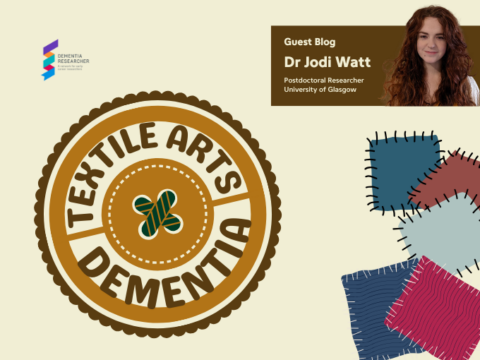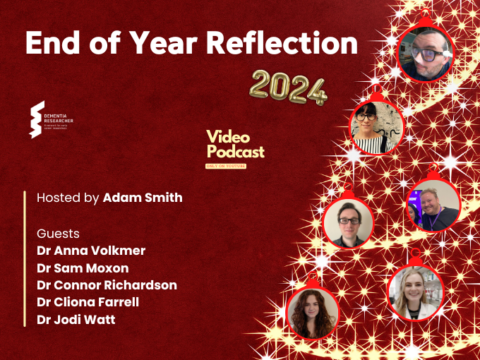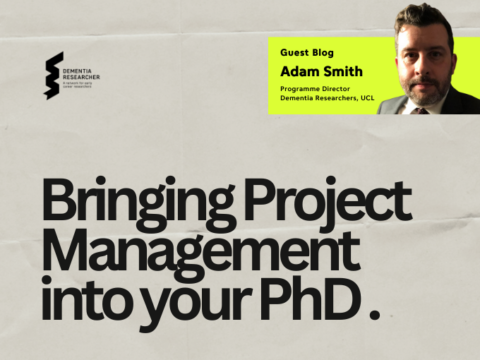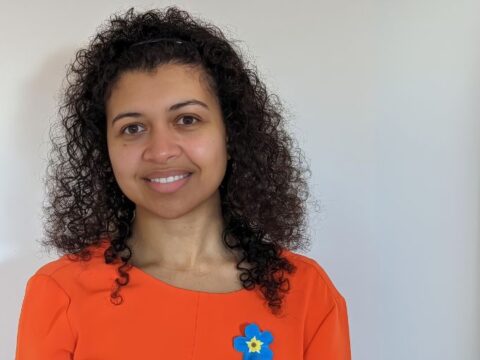This week Adam Smith hosts this informal discussion with three lab-based researchers. Recorded remotely and discussing how they’re all managing to physically and mentally well, and how life has changed since the 23rd March.
Dr Katy Askew, Postdoctoral Research Fellow and PhD student Makis Tzioras both from The University of Edinburgh and Dr Isabel Castanho a postdoc researcher at University of Exeter joined the podcast remotely to discuss and share.
These three will be back again in a few weeks’ time to discuss in greater details, how they manage the pressures of academia with a focus on mental health and wellness.
Voice Over:
Welcome to the NIHR Dementia Researcher Podcast brought to you by dementiaresearcher.nihr.ac.uk, in association with Alzheimer’s Research UK and Alzheimer’s Society, supporting early career dementia researchers across the world.
Adam Smith:
Hello, I am Adam Smith and I’d like to thank you for joining the NIHR Dementia Researcher Podcast. This is a bit of an impromptu podcast today, because I’ve been with three fantastic individuals talking about mental health challenges and anxiety in academia and it’s been wonderful. I’m joined by Dr. Katy Askew, Dr Isabel Castanho, Makis Tzioras. We’ve been talking about that subject, and what we didn’t have time to do was to talk about the particular unique challenges that we’re facing right now, which is of course we’re all sat at home, restricted on our movements to protect ourselves and the NHS. Of course, this presents a whole new set of challenges outside of our normal ones. So I thought while we have everybody in the room, we’d spend a little bit of time talking about this. So hello, maybe Katy, could you quickly introduce yourself?
Dr Katy Askew:
Hello again. So I’m Katie, I’m a postdoc working at the University of Edinburgh and this will now probably be the set third time you’ve heard me say this. I work on the innate immune system in a rodent model of vascular cognitive impairment.
Adam Smith:
Thank you, Katie. Makis?
Makis Tzioras:
Oh yeah, I’m Makis. I’m a PhD student at the University of Edinburgh and I’m working on Alzheimer’s disease, and specifically I’m looking at glial cells, which I really love, and their interactions with synapses in aging as well.
Adam Smith:
Thank you very much. Maybe I can… Last but not least, can I come to you Isabel?
Dr Isabel Castanho:
Hey again, my name is Isabel. I’m a postdoctoral researcher at the University of Exeter, where I do research on epigenetics of Alzheimer’s disease in mouse models.
Adam Smith:
Thank you, the three of you for joining us, and for carrying on after we’ve already recorded our previous podcast, just to talk particularly about this. So we’re all at home right now. We have been for three weeks, and labs have been closed, conferences and events have been cancelled. Do you, can I maybe ask this, well do you all work in bench science where you can carry on, you can’t? Everybody’s nodding. So let’s come back to you, Katie, first of all. So how were you managing to occupy yourself at the moment? Well, what are your circumstances? You’re not furloughed I assume, you’re still… That’s good.
Dr Katy Askew:
Yeah, so I mean, I’m really lucky I’m still being paid, which is great. So as I mentioned in the previous podcasts, I’ve got a year left on my postdoc contract. We’re in a position at the moment where we’ve just come to the end of a big study, so actually I’ve got a paper to write, which is occupying my time now, but I was supposed to be starting another really big study, the biggest study of my postdoc now. So we had been breeding mice for months, we’d spend a lot of money ordering in a drug to test and that has been put on hold indefinitely. It’s at least a year’s worth of work, so I don’t really know at the moment how that’s all going to fit in before the end of my contract, because we don’t know when we’re going to go back into the lab.
Adam Smith:
And how are you funded? Are you funded by some of the big funders, or?
Dr Katy Askew:
Yeah, so I’m funded by Alzheimer’s Research UK. I’m working as part of the program grant, so we had a three year program grant between our lab two, other labs in Edinburgh and a lab in Newcastle. And some parts of that program grant have already come to an end. Some of it hasn’t. So I mean, I don’t know what ARUK are doing in terms of funding at the moment, but I’m not part of the UKDRI network, that’s for sure charity funded.
Adam Smith:
I think the institutes that… The funders have been pretty good and speedy to give out information on how things should happen. But I think it is a particularly anxious time for those that are in that circumstance of knowing. I saw that my own university had just recently sent out some emails this week saying that the rules around furlough for grant funded research is maybe about change, so they could potentially furlough you on a grant, which would save the grant money. It means a drop in income, but it means that the grant money then is protected so you can resume and pick up where you left off when you return, which might I suppose in some ways, protect the science funding, but that isn’t necessarily helpful for individuals. Makis, how about you?
Makis Tzioras:
Obviously it’s a strange time because we would have never expected a pandemic to happen in our lifetime. I have to say I’ve been doing quite well, I’ve been actually quite enjoying working from home. It came to me in a time where… I was in a situation where I have this paper that I’ve been writing and had to finish writing it, and then I had to decide whether we’re going to submit what we have now, or do months and months’ worth of experiments and tried to make it into an even bigger story. And it was great because it kind of decided for us that, “Okay, we have what we have now and we’re going to make the best of what we have” and transcend the paper as it is.
Adam Smith:
Quite good timing for you then, it came at a good time for when- [crosstalk 00:06:18]
Makis Tzioras:
Yeah, absolutely. It was a time where I just really felt like I really need to sit down in my third year, and before I go on to do a new big project, sit down and kind of collect everything I have and just be done with that.
Adam Smith:
Thank you Makis. Isabel, what are your circumstances right now?
Dr Isabel Castanho:
So, as Katie, I’m also funded by AR UK and in a way… I consider myself more 50/50, so 50% lab based and 50% bioinformatics and analysis. So I’m lucky in a way as I still have work to do. I was running experiments and optimising things and breeding animals and all of that is delayed, because we had to pause all of that. But I still have lots of work that I can do from home, and I was used to working from home anyway. I usually try to do it once a week and actually, I think 99% of my PhD thesis was written at home.
Dr Isabel Castanho:
However, this is different. I find that right now is a really challenging time. Everything just changed in an instant and I’ve been… Well one, there was this high expectation as well when we started that, “Oh, we now have so much time in our hands.” I started with “Oh, I’ll write papers, I’ll write grants, I’ll do all the webinars, all the courses.” And I feel I’ve hit, I’m just against the wall in a way. I’ve been feeling quite unproductive, unmotivated, and I don’t want to feel this way, so in a way it’s a bit exhausting. So, I’m trying to take one day at a time and see the small achievement as small successes. So doing an analysis, reading a paper, submitting a report instead of just looking at finishing this big experiment or this big analysis. I’m trying to look at the small steps more and more.
Adam Smith:
Thank you, Isabel. I think, yeah… Well first of all it’s great to know that everybody’s still got a job, everybody is still getting paid. We know that that isn’t necessarily the situation for everybody who might be listening, so I think we all recognise how fortunate we are to be able to stay home and stay safe and also still be able to draw our wages, and still try to work as productively as we can. So, well this is a really super short podcast cause I know Katie has an appointment to rush off to, so we’re going to go round and just talk about a few top tips. I’m going to give mine first.
Adam Smith:
So I worked from home quite a lot before this, before the current movement restrictions came in anyway. So, it’s kind of been a normal day for me, it’s like “Oh, I don’t get it, this is what I always do.” So my top tips are, I write a to-do list, because I really like crossing things off. I’m one of those people that likes to tick my list. So writing a to-do list, even if it’s really small things like “Oh I must send that email” or, “I must post this” or “I must write that piece that I said I’d write.” Makis is showing me a to-do list in his camera. We should say we’re all not together, obviously. And, cause I really enjoy doing it. So my top tip for staying productive is to do the to-do list.
Adam Smith:
I think there’s been a massive growth in webinars right now. I mean I’m part of the problem. I’m one of the people that’s recording them, but I think there’s certainly no shortage of things to occupy yourself if you want to. And I think actually things like the webinars, or our podcasts, give you a nice excuse actually to get away for, if you are kind of supposed to be sitting there writing and you’re stuck and you want a distraction, going off and listening to a podcast or joining a webinar for half an hour where you are semi-involved makes you feel slightly less guilty. Not that you should feel guilty by not staying away. I don’t know that there are so many different issues to this, aren’t they? I mean for me, I think I find I work flexibly over the course of the day. My nine to five just merges into evenings and daytime’s, and I just make sure the work is done, but I don’t necessarily keep a nine to five. But other people would say “Absolutely not, don’t do that, you should just keep rigid structure.”
Adam Smith:
That works for me, and I think actually the main point of this right now is this, just do whatever works for you. If that is working nine to five then do so. If it’s taking two hours off to go and read in the afternoon and then come back in the evenings, then do that too. Whatever keeps you healthy. Katie, what are your top tips? How are you coping?
Dr Katy Askew:
I mean I’m very much in survival mode right now. This whole experience has not been great for my mental health, or my productivity has actually. So I live alone, I am 400 miles away from everybody I know, well not everyone, my friends and family, my boyfriend. And I know in terms of other postdocs and PhD students family distances that’s not a lot, but it’s really tough and I have tried really hard for a long time to not work at home. So now having to work from home is difficult. And I mean as Adam says you have to do what works. I’m trying to sort of work between nine and four. I have set a power hour for myself between four and five for yoga, and some kind of exercise. At the moment my anxiety means I can’t leave the house, which super sucks.
Adam Smith:
Is that because of consciousness about the disease, or?
Dr Katy Askew:
Oh no. I mean I’m not worried about getting it because there’s nobody here give it to. It’s the uncertainty, like I can control everything that’s happening in my flat. Everything that comes in comes out, I can control. If I go out for a walk, who knows what’s going to happen? So, I mean it’s one of those stupid anxiety things that home is a safe place, and I’m lucky to have a place that’s mine that I am comfortable in. So I’m okay, relatively okay, with not going outside. It’s fine, it’s not ideal, but it is what it is at the moment.
Dr Katy Askew:
So I am trying to work where I can. I have been nowhere near as productive as I expected to be. I also wrote a really optimistic list of things I was going to do, which went out of the window within the first week of being at home. This week has been really tough, and I hardly achieved anything but that is okay, because it’s a global pandemic, I don’t really think it’s realistic to expect yourself to write grants and write papers and do everything ever, because there is so much happening that’s hard to cope with, you know?
Adam Smith:
Thank you.
Dr Katy Askew:
That wasn’t really a tip, that was more of a “Katie’s having a hard time, it’s also okay if you’re having a hard time.”
Adam Smith:
No, I think it was a tip, I completely agree with you. I think a lot of people will be facing that same anxiety. I know I feel rather bipolar at the moment. I kind of flip between absolute despair, thinking “This is terrible and it’s not going to end and I don’t want to go outside” to thinking “Oh actually this is amazing, this is great. I’ve got more time than ever. I can be in the garden on a lunchtime at home, and reading books, and doing things.” And I absolutely flip between thinking this actually isn’t so bad to thinking this is awful. And so I can understand that, as long as you’re managing to still get food? You’re not sitting at home living on rice and water and… going to end up frying up those bunny droppings to eat- (Katy has pet Rabbits at home)
Dr Katy Askew:
Never!
Adam Smith:
Bunny droppings! Not bunnies.
Dr Katy Askew:
I have a weekly trip to Sainsbury’s and that is a struggle, but it’s fine. I have a list and if anything’s not on that list and I can’t find it, that’s it. There’s no improvisation anymore, it’s either we get what’s on the list or we don’t get things, so it’s again not ideal, but it’s fine.
Adam Smith:
I recognise that I’ve got halfway around Tesco’s, realised I’ve only got about a third of my list, and then just being cross for the rest of the walking round, angrily staring at every other customer in there and every member of staff, that it’s their fault I couldn’t get bananas. I share that. Makis, how are you staying? How are you staying well?
Makis Tzioras:
For me, I think I realized one of the things that it was doing, not everyone may relate to it but for me it helped a lot. I was on the phone with my friend and she was saying how much she is struggling with the fact that she’s trying to like fit her previous routine to now. And, for me that’s when it really clicked and I was like “Why are you doing that? That doesn’t make any sense. You can’t fit a way of living in the current situation, where you can’t have the things you did before.” Do you know what I mean?
Makis Tzioras:
You are in a time where you have to find what works for you in a different way. And it’s a great time to start doing things in a way that may be actually better than before. So, working a nine to five may have worked before, and it doesn’t now. Go with it. I mean, who cares? For me, before it was not really nine to five, now I actually find working a nine to five works a lot better, because it just puts me on really nice path from a day and that works well. So don’t try to do something that just doesn’t need to happen. You’re not supposed to be living any way apart from the way that you want to live. So just go with your own routine.
Adam Smith:
And do you think this will change how you… When things gradually return to some form of normality or the “What is the new normal? Is this the new normal?” Do you think this will change your work in future? Would you be, will this influence your work patterns before? Are you going to work from home more, or have you found some new things that work for you? Katie’s shaking her head, absolutely not, you want to be back in the lab, right?
Makis Tzioras:
Listen, I’ll tell you one thing, and you said that before about this new emergence of all this new [inaudible 00:17:30] series and webinars and everything, and it’s actually great for someone who wants to listen to them and who wants to escape, and it’s giving me the opportunity of things still happening.
Makis Tzioras:
I have found that this has been actually very stressful. So I don’t try to go to as many webinars I can, and people are saying, “Oh, are you going to go to that seminar series?” And what I have to say is “Absolutely not!” I will absolutely not go to a seminar series that I was not going to go to before, and I’m not going to go now, and I’m not going to stress out about doing all these things, and filling up 24 hours a day with all these little things. I’m going to do my life the way I want to do it. I’m not going to be pressured by anyone to go to all these new things that, they’re great for the ones who want to do them. I’m not saying they shouldn’t happen. I’m just not going to stress about them.
Adam Smith:
I completely agree. Honestly, it feels slightly bombarded at the minute. You know, people like me who’ve set up this dementia research service have suddenly got time and space and going “Oh, what can we do to keep early career researchers busy? We’ll set up a bunch of webinars” and I’d like to say we were one of the first. I think we were doing it before and then in the last week I’ve just seen that there are loads going on. There’s something every other day of the year, everybody’s jumped on this. Maybe I’m going to slow it down a little bit. They’re not necessary, let’s give people some space.
Makis Tzioras:
No this is great, because there’s something for everyone out there, because the more you provide the more people are going to find what fits for them. But, you shouldn’t feel like you have to listen to every talk and everything that’s coming out now.
Adam Smith:
I agree. Also, I think ours have been slightly lighter and informal. I think some of them are seen as quite heavy on the science, they’re hour long presentations. Whereas, I think the ones we’ve done with dementia research are just a 20 minute presentation of somebody’s PhD, 10 minute questions, and we’re just something short, fairly light. Isabel how are you keeping well? I’m conscious, Katie you have to go shortly so we’ll try and keep this.
Dr Isabel Castanho:
I just wanted, since you asked about tips as well, just moving slightly on the topic, cause there’s something that I found that has helped me before when I worked from home, and I’m doing it and I’ve heard some feedback from colleagues after we discussed that said that it helped, which is having a dedicated space for work. I know that this doesn’t work in the same way for everyone, but I’m lucky. When we rented this flat we decided to go with a two bedroom flat, exactly so we could have a home office. And so, for me, it does really help that this is my dedicated space for work. When I’m not working, I just step away from it. I can even shut the door and it’s really helpful. So in any type of schedule, you’re working nine to five or something more flexible, just having a dedicated space is really helpful.
Adam Smith:
I completely agree. I know not everybody has that luxury, but being able to close the door. I wrote a blog earlier this week about video calling etiquette, and I think one of the things I put in that was closing a door. I read it back yesterday and said I thought “I sound like a right stick in the mud. I need to like cheer up a bit.” Anyway, I’m really not that grumpy, I promise. I know this was super short, but thank you very much because everybody has other things to go to and we’ve tacked it onto the end of another podcast. Thank you very much Katie, Isabel and Makis for joining us. I hope you all stay home, stay well, stay healthy, and please do take your own advice. If you are struggling do go talk to somebody. Thank you very much again. For those who are listening, if you have been affected by any of the things we’ve talked about today, there will be some links to some resources alongside this podcast which you can access.
Adam Smith:
Thank you very much for listening. Please do visit our website, dementiaresearcher.nihr.ac.uk, where you’ll find information on all of our webinars. You’ll find blogs and articles on some of the things we’ve talked about, particularly about how to perhaps stay effective and productive at home, how stay well, and also links to the webinars I referred to before, the recordings of previous ones and ones we’ve got coming up. If you’d like to join us in a webinar or a podcast, please do drop us a line at dementiaresearcher@nihr.ac.uk. Thank you very much everybody again for joining us and we’ll see you again soon.
Voice Over:
Brought to you by dementiaresearcher.nihr.ac.uk, in association with Alzheimer’s research UK and Alzheimer’s society, supporting early career dementia researchers across the world.
END
Like what you hear? Please review, like, and share our podcast – and don’t forget to subscribe to ensure you never miss an episode.
If you would like to share your own experiences or discuss your research in a blog or on a podcast, drop us a line to adam.smith@nihr.ac.uk or find us on twitter @dem_researcher
You can find our podcast on iTunes, SoundCloud and Spotify (and most podcast apps).

 Print This Post
Print This Post





